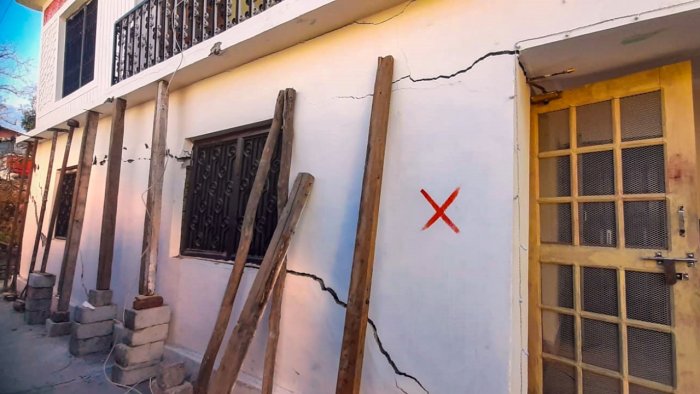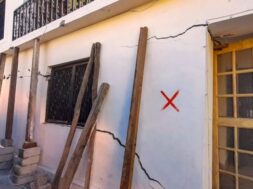
Demolition of Unsafe Buildings Resumed in Joshimath, Some Troops Shifted from “Sinking” Town
Manas Dasgupta
NEW DELH, Jan 12: Demolition of some “dangerous” structures including two hotels in the “sinking” pilgrim town of Joshimath in Uttarakhand resumed on Thursday after halt due to protests by local residents, even as the authorities shifted some army personnel from the cantonment after cracks developed in some military establishments.
Cranes brought down generator sets as disaster response teams in yellow hard hats began dismantling two multi-storey hotels deemed unsafe because of shifting soil.
The Chief of the Army Staff General Manoj Pande said on Thursday that some soldiers have been temporarily moved from areas surrounding Uttarakhand’s “sinking town” Joshimath located near the Line of Actual Control (LAC) with China. Nearly 30 buildings of the army have developed minor cracks.
“25 to 28 buildings of the army have developed minor cracks and the soldiers have been temporarily relocated,” the Army chief said. If needed, said General Pande, the troops would be permanently relocated to Auli, he said.
The Army Chief said over 20 military installations around Joshimath have “medium to minor damage.” “We remain prepared to relocate more units if required, but our operational preparedness remains intact,” General Pande said in an annual address. “There has been no impact on our readiness.”
Official sources said it would take up to seven days to take apart the seven-storied Malari Inn and the five-storied Mount View hotels which stand leaning in the danger zone, posing a threat to more than a dozen houses. The demolitions resumed following a revised compensation deal for residents after more than a hundred protesters in the town of around 20,000 people stopped the work, saying they were not being paid enough compensation.
Uttarakhand Chief Minister Pushkar Singh Dhami, who visited Joshimath and held meetings with locals and experts on Thursday, said a committee would decide the rate for compensation to be paid to the affected families, keeping in mind the interests of stakeholders. “For now, ₹ 1.5 lakh will be given to each affected family starting this evening. This is only a temporary measure. We are still working on compensation rates. Only 25 per cent of buildings in Joshimath are affected,” Mr Dhami said.
“The winter games in Auli are beginning in February and the Char Dham Yatra in a few months. Sending a message outside Joshimath that the entire town is sinking is wrong. It will adversely impact the local economy,” the Chief Minister said.
More demolition would follow as over 700 buildings – nearly a fourth of the town’s total – have developed cracks. Some are leaning precariously, spurring calls from residents and environmental campaigners for a halt to construction in the ecologically sensitive area.
The Union Home Minister Amit Shah on Thursday led a high-level meeting to review the situation with Union Ministers Nitin Gadkari, RK Singh, Bhupendra Yadav and Gajendra Singh Shekhawat and senior government officials at his home.
The town of Joshimath is a gateway to Hindu and Sikh shrines as well as tourist hotspots like Auli. Thousands of people have been relocated since buildings in the town began developing cracks earlier this month.
For years, environmentalists and locals have warned about indiscriminate construction in sensitive towns like Joshimath. Ignoring many of these calls, the government has widened roads, and built dams and power plants besides allowing hotels and multi-storey buildings to mushroom.
The area is also a key Indian garrison centre to defend a large portion of the 3,488-km border with China known as the Line of Actual Control. India has over 20,000 troops and military hardware in the area. Gaping cracks have appeared in more than 700 buildings in the town that is home to a population of 20,000. Many buildings are on the verge of collapse.
A Hindu religious leader’s petition before the Supreme Court seeks to stop the construction of a hydroelectric project that many locals say is causing the sinking. The petition asks the court to stop work on a tunnel being built by state-run NTPC for its nearby hydroelectric power project. The Supreme Court will hear the petition on Monday.
The crisis has reignited a decades-old development versus environment debate in the region. The petition wants the tunnel to be examined and approved by a panel of geologists, hydrologists and engineers.














